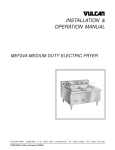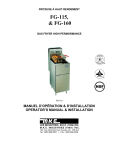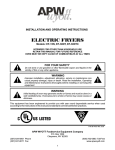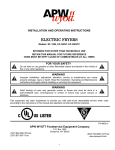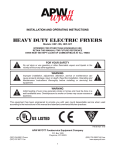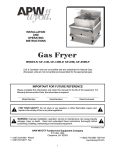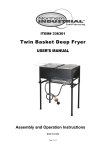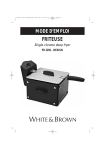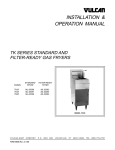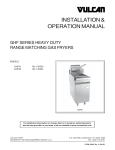Download Vulcan-Hart MGF24 Troubleshooting guide
Transcript
INSTALLATION & OPERATION MANUAL MGF24 MEDIUM DUTY GAS FRYER VULCAN-HART COMPANY, P.O. FORM 30951 (10-95) (Formerly F-990602) BOX 696, LOUISVILLE, KY 40201-0696, TEL. (502) 7 7 8 - 2 7 9 1 IMPORTANT FOR YOUR SAFETY THIS MANUAL HAS BEEN PREPARED FOR PERSONNEL QUALIFIED TO INSTALL GAS EQUIPMENT, WHO SHOULD PERFORM THE INITIAL FIELD START-UP AND ADJUSTMENTS OF THE EQUIPMENT COVERED BY THIS MANUAL. POST IN A PROMINENT LOCATION THE INSTRUCTIONS TO BE FOLLOWED IN THE EVENT THE SMELL OF GAS IS DETECTED. THIS INFORMATION CAN BE OBTAINED FROM THE LOCAL GAS SUPPLIER. IMPORTANT IN THE EVENT A GAS ODOR IS DETECTED, SHUT DOWN UNITS AT MAIN SHUTOFF VALVE AND CONTACT THE LOCAL GAS COMPANY OR GAS SUPPLIER FOR SERVICE. FOR YOUR SAFETY DO NOT STORE OR USE GASOLINE OR OTHER FLAMMABLE VAPORS OR LIQUIDS IN THE VICINITY OF THIS OR ANY OTHER APPLIANCE. WARNING IMPROPER INSTALLATION, ADJUSTMENT, ALTERATION, SERVICE OR MAINTENANCE CAN CAUSE PROPERTY DAMAGE, INJURY OR DEATH. READ THE INSTALLATION, OPERATING AND MAINTENANCE INSTRUCTIONS THOROUGHLY BEFORE INSTALLING OR SERVICING THIS EQUIPMENT. IN THE EVENT OF A POWER FAILURE, DO NOT ATTEMPT TO OPERATE THIS DEVICE. —2— TABLE OF CONTENTS GENERAL. . . . . . . . . . . . . . . . . . . . . . . . . . . . . . . . . . . . . . . . . . . . . . . . . . . . . . . . . . . . . . . . . . . . . . 4 INSTALLATION . . . . . . . . . . . . . . . . . . . . . . . . . . . . . . . . . . . . . . . . . . . . . . . . . . . . . . . . . . . . . . . . . 4 Unpacking . . . . . . . . . . . . . . . . . . . . . . . . . . . . . . . . . . . . . . . . . . . . . . . . . . . . . . . . . . . . . . . . 4 Location . . . . . . . . . . . . . . . . . . . . . . . . . . . . . . . . . . . . . . . . . . . . . . . . . . . . . . . . . . . . . . . . . 4 Installation Codes and Standards . . . . . . . . . . . . . . . . . . . . . . . . . . . . . . . . . . . . . . . . . . . . . 5 Assembly . . . . . . . . . . . . . . . . . . . . . . . . . . . . . . . . . . . . . . . . . . . . . . . . . . . . . . . . . . . . . . . . 5 Gas Connections . . . . . . . . . . . . . . . . . . . . . . . . . . . . . . . . . . . . . . . . . . . . . . . . . . . . . . . . . . 5 Testing the Gas Supply System . . . . . . . . . . . . . . . . . . . . . . . . . . . . . . . . . . . . . . . . . . . . . . 6 Leveling the Fryer . . . . . . . . . . . . . . . . . . . . . . . . . . . . . . . . . . . . . . . . . . . . . . . . . . . . . . . . . 6 Flue Connections . . . . . . . . . . . . . . . . . . . . . . . . . . . . . . . . . . . . . . . . . . . . . . . . . . . . . . . . . . 6 Electrical Connections . . . . . . . . . . . . . . . . . . . . . . . . . . . . . . . . . . . . . . . . . . . . . . . . . . . . . . 6 Adjustments . . . . . . . . . . . . . . . . . . . . . . . . . . . . . . . . . . . . . . . . . . . . . . . . . . . . . . . . . . . . . . 7 OPERATION . . . . . . . . . . . . . . . . . . . . . . . . . . . . . . . . . . . . . . . . . . . . . . . . . . . . . . . . . . . . . . . . . . . 9 Controls . . . . . . . . . . . . . . . . . . . . . . . . . . . . . . . . . . . . . . . . . . . . . . . . . . . . . . . . . . . . . . . . . 9 Before First Use . . . . . . . . . . . . . . . . . . . . . . . . . . . . . . . . . . . . . . . . . . . . . . . . . . . . . . . . . . . 9 Lighting the Pilot . . . . . . . . . . . . . . . . . . . . . . . . . . . . . . . . . . . . . . . . . . . . . . . . . . . . . . . . . . 9 Adding Frying Compound . . . . . . . . . . . . . . . . . . . . . . . . . . . . . . . . . . . . . . . . . . . . . . . . . . 10 Turning the Fryer On . . . . . . . . . . . . . . . . . . . . . . . . . . . . . . . . . . . . . . . . . . . . . . . . . . . . . . 10 Turning the Fryer OFF . . . . . . . . . . . . . . . . . . . . . . . . . . . . . . . . . . . . . . . . . . . . . . . . . . . . . 10 High Limit Device . . . . . . . . . . . . . . . . . . . . . . . . . . . . . . . . . . . . . . . . . . . . . . . . . . . . . . . . . 10 Cleaning . . . . . . . . . . . . . . . . . . . . . . . . . . . . . . . . . . . . . . . . . . . . . . . . . . . . . . . . . . . . . . . . 10 Frying Compound Maintenance . . . . . . . . . . . . . . . . . . . . . . . . . . . . . . . . . . . . . . . . . . . . . 12 Suggested Time and Temperature Chart for Deep Fat Frying . . . . . . . . . . . . . . . . . . . . . 13 MAINTENANCE . . . . . . . . . . . . . . . . . . . . . . . . . . . . . . . . . . . . . . . . . . . . . . . . . . . . . . . . . . . . . . . . 14 Vent . . . . . . . . . . . . . . . . . . . . . . . . . . . . . . . . . . . . . . . . . . . . . . . . . . . . . . . . . . . . . . . . . . . . 14 Service and Parts Information . . . . . . . . . . . . . . . . . . . . . . . . . . . . . . . . . . . . . . . . . . . . . . . 14 DEEP FRYING TROUBLESHOOTING GUIDE . . . . . . . . . . . . . . . . . . . . . . . . . . . . . . . . . . . . . . . 15 —3— Installation, Operation and Care of MODEL MGF24 GAS FRYER PLEASE KEEP THIS MANUAL FOR FUTURE USE GENERAL Vulcan fryers are produced with quality workmanship and material. Proper installation, usage and maintenance of your fryer will result in many years of satisfactory performance. It is suggested that you thoroughly read this entire manual and carefully follow all of the instructions provided. INSTALLATION The fryer must be restrained with adequate ties to prevent tipping when installed in order to avoid the splashing of hot liquid. UNPACKING This fryer was inspected before leaving the factory. The transportation company assumes full responsibility for safe delivery upon acceptance of the shipment. Immediately after unpacking, check for possible shipping damage. If the fryer is found to be damaged, save the packaging material and contact the carrier within 15 days of delivery. Carefully unpack fryer and place in a work-accessible area as near to its final installed position as possible. Remove the packing bag containing the adjustable legs from inside the carton. Before installing,verify that the electrical service and type of gas supply (natural or propane) agree with the specifications on the rating plate located on the inside of the front panel. If the supply and equipment requirements do not agree, do not proceed with the installation. Contact your dealer or Vulcan-Hart Company immediately. LOCATION The equipment area must be kept free and clear of combustible substances. This fryer is for use only in locations adjacent to non-combustible construction. —4— When installed, minimum clearance from combustible and non-combustible construction must be 6" at the sides and 6" at the rear. There must be at least 16" clearance between the fryer and any open top flame units. The fryer may be installed on combustible floors. The installation location must allow adequate clearances for servicing and proper operation. A minimum front clearance of 36" is required. Do not obstruct the flow of combustion and ventilation air. Adequate clearance for air openings into the combustion chamber must be provided. Make sure there is an adequate supply of air in the room to replace air taken out by the ventilating system. This will prevent fryer function from being affected by a reduced atmospheric pressure. Do not permit fans to blow directly at the fryer. Wherever possible, avoid open windows next to the sides or back of the fryer. Avoid wall-type fans which create air cross currents within the room. INSTALLATION CODES AND STANDARDS The fryer must be installed in accordance with: 1. State and local codes. 2. National Fuel Gas Code, ANSI-Z223.1 (latest edition). Copies may be obtained from The American Gas Associaton, Inc., 1515 Wilson Blvd., Arlington, VA 22209. 3. National Electrical Code, ANSI/NFPA-70 (latest edition). Copies may be obtained from The National Fire Protection Association, Batterymarch Park, Quincy, MA 02269. ASSEMBLY Screw the legs into the permanently fastened nuts on four corners of the fryer bottom. Tighten the legs and set the fryer in place. CAUTION: Do not slide fryer with legs mounted. If it is necessary to move the fryer, allow it to cool, then lift it. GAS CONNECTIONS CAUTION: All gas supply connections and any pipe joint compound used must be resistant to the action of propane gases. All fryers are equipped with fixed orifices for use with either natural or propane gas, as ordered, and no adjustment is necessary. Fryers for operation on natural or propane gas must have a pressure regulator with an outlet pressure of 4" Water Column for natural gas supply, and 10.0" Water Column for propane gas supply. These pressure regulators are available from Vulcan-Hart. Codes require that a gas shutoff valve be installed in the gas line ahead of the fryer. —5— Connect gas supply to the fryer. The gas supply line must be at least the equivalent of 3/4" iron pipe. Make sure the pipes are clean and free of obstructions, dirt, and piping compound. Hold the gas inlet pipe (in front of the manual valve) tight when making connections to prevent pressure regulator from rotating and damaging internal tubing connections. WARNING: PRIOR TO LIGHTING, CHECK ALL JOINTS IN THE GAS SUPPLY LINE FOR LEAKS. USE SOAP AND WATER SOLUTION. DO NOT USE AN OPEN FLAME. After piping has been checked for leaks, fully purge all piping receiving gas to remove air. TESTING THE GAS SUPPLY SYSTEM When test pressures exceed 1/2 psig (3.45 kPa), the fryer and its individual shutoff valve must be disconnected from the gas supply piping system. When test pressures are 1/2 psig (3.45 kPa) or less, the fryer must be isolated from the gas supply system by closing its individual manual shutoff valve. LEVELING THE FRYER Once gas connections have been made, place a spirit level on top of the fryer. Turn the adjustment screw at the bottom of each leg until the fryer is level front-to-back and side-to-side. FLUE CONNECTIONS Adequate ventilation should be provided by a hood with vent and exhaust fan. Never make flue connections directly to the fryer. A minimum clearance of 18" must be maintained from the termination of the flue vent to the filters of the hood venting system. Do not obstruct the flow of flue gases from the flue duct located on the rear of the fryer. It is recommended that the flue gases be ventilated to the outside of the building through a ventilation system installed by qualified personnel. Information on the construction and installation of ventilating hoods may be obtained from the "Standard for Removal of Vapors from Commercial Cooking Equipment," NFPA #96 (latest edition), available from the National Fire Protection Association, Batterymarch Park, Quincy, MA 02269. ELECTRICAL CONNECTIONS WARNING: ELECTRICAL AND GROUNDING CONNECTIONS MUST COMPLY WITH THE APPLICABLE PORTIONS OF THE NATIONAL ELECTRICAL CODE AND/OR OTHER LOCAL ELECTRICAL CODES. —6— WARNING: APPLIANCES EQUIPPED WITH A FLEXIBLE ELECTRIC SUPPLY CORD ARE PROVIDED WITH A THREE-PRONG GROUNDING PLUG. IT IS IMPERATIVE THAT THIS PLUG BE CONNECTED INTO A PROPERLY GROUNDED THREE-PRONG RECEPTACLE. IF THE RECEPTACLE IS NOT THE PROPER GROUNDING TYPE, CONTACT AN ELECTRICIAN. DO NOT REMOVE THE GROUNDING PRONG FROM THIS PLUG. A 120-volt, 3-wire, 60 Hz. supply cord is supplied at the rear of the fryer. Do not connect the fryer to electrical supply until after gas connections have been made. An electrical diagram is located on the inside of the front panel. ADJUSTMENTS To Open Front Panel 1. Remove control knob by grasping the outer edge of the knob and pulling it straight out, without twisting or turning. 2. Turn quick connect fasteners 1/4 turn counterclockwise. 3. Pull the top edge of the front panel to open. Reverse the procedure to close the front panel. Main Burner Air Supply For efficient burner operation, it is important that a proper balance of gas volume and primary air supply is maintained, resulting in complete combustion. Insufficient air supply results in a yellow streaming flame. Primary air supply is controlled by an air shutter on the front of the burner. Loosen the hexagonal head screw on front of the burner. Adjust the air shutter to just eliminate yellow tips of burner flame. Lock the air shutter in place by tightening the screws. Repeat this procedure with all burners. Pilot Flame To adjust the pilot flame, remove the pilot adjustment cap to expose the adjusting screw (Fig. 1). Rotate the adjusting screw clockwise to reduce the gas flow and counterclockwise to increase the gas flow to provide a properly sized pilot flame (approximately 1/2" to 3/4" long). Replace adjustment cap. —7— Fig. 1 —8— OPERATION WARNING: HOT OIL AND PARTS CAN CAUSE BURNS. CLEANING AND SERVICING THE FRYER. USE CARE WHEN OPERATING, WARNING: SPILLING HOT OIL CAN CAUSE SEVERE BURNS. DO NOT MOVE FRYER WITHOUT DRAINING ALL OIL FROM THE TANK. CONTROLS Indicating Light — When lit, indicates that thermostat is calling for gas to the burners. Thermostat — Maintains temperature of oil in tank. BEFORE FIRST USE Cleaning Using a non-corrosive, grease-dissolving commercial cleaner, clean the protective metal oils from all surface parts and the fry tank interior. Follow the cleaner manufacturer's directions. To empty fry tank, grasp the black handle on the pivotal head above the fry tank and swing it to the left of the fryer until it stops. Firmly grasp both handles of the fry tank and lift it out. Rinse thoroughly and drain. Be sure to remove all traces of cleaner; it can affect the food taste. Wipe fry tank completely dry with a soft clean cloth. Clean all fryer accessories. Rinse all parts thoroughly and wipe dry. Seasoning Light seasoning of the backsplash area is required to avoid possible surface corrosion. With a soft, lint-free cloth, apply a thin layer of cooking oil over entire backsplash area. This should also be done after every cleaning. LIGHTING THE PILOT Lighting instructions are also inside the front panel. 1. Turn main gas supply ON. 2. Turn thermostat control knob to the OFF position. 3. Wait for five minutes, then depress the red button on the shutoff valve (see Fig. 1) and light pilot through the observation hole in the front panel. Keep red button depressed for one minute after lighting. 4. If the pilot does not stay lit, repeat Step 3. —9— ADDING FRYING COMPOUND Fill fry tank to the FULL mark (approximately 30 pounds) with liquid or solid frying compound. Do not overfill. When using solid frying compound, set the thermostat at 200°F and allow compound to liquify, then adjust compound level. Do not allow frying compound level to drop below the ADD mark. For proper operation of the fryer and good frying results, the frying level should be maintained between the FULL and the ADD marks. TURNING THE FRYER ON CAUTION: Before turning the burners on, the fry tank must be filled with liquid frying compound. If this is not done, the tank walls can be damaged. Warpage can cause leaks. All burners are lit from constantly burning pilots. Turn thermostat control knob to desired temperature to put fryer in operation. TURNING THE FRYER OFF Temporary Shutdown Turn thermostat to OFF position. Seasonal Shutdown Turn thermostat to OFF position. Turn gas shutoff valve OFF. HIGH LIMIT DEVICE A high limit device will shut the fryer down if the oil overheats. DO NOT relight pilot until oil temperature has lowered to at least 350°F. If the situation persists, contact your local Vulcan-Hart authorized servicer. CLEANING WARNING: DISCONNECT ELECTRICAL POWER SUPPLY BEFORE CLEANING. CAUTION: Do not spray with hose or steam cleaner. Doing so will cause extensive damage (not covered under warranty). Daily Clean your fryer regularly. If regular cleaning is neglected, grease will be burned on and discolorations may form. These may be removed by washing with any detergent or soap and water. Particularly stubborn discolorations may be removed with a self-soaping scouring pad or a paste made of water and a mild scouring powder applied with a plastic open pad or sponge. Do not use standard steel wool on stainless steel finishes. Pieces of the steel wool will adhere to the stainless steel and cause rusting. — 10 — Clean all stainless steel surfaces with a damp cloth and polish with a soft dry cloth. A non-abrasive cleaner may be used to remove discolorations. Always rub in the direction of the polish lines on the stainless steel to preserve the original finish. To prevent water spots and streaks, rinse equipment thoroughly with warm water and wipe dry with a soft clean cloth. The addition of a rinsing agent will also help prevent spotting. Keeping the fryer exterior clean and free of accumulated grease will prevent stubborn stains from forming. Wash all exterior surfaces at least once daily. Use a cloth with warm water and a mild soap or detergent. Follow with a clear rinse, then dry. Weekly or as Required The frequency of cleaning depends on the load conditions. Set a definite cleaning schedule corresponding to how much the fryer is used. Cleaning should be done at least once a week. 1. Turn the thermostat to OFF and allow tank to cool. 2. Remove the fry baskets. 3. Grasp the black handle on the pivotal head above the fry tank and swing it to the left of the fryer until it stops. 4. Remove the crumb tray. 5. Firmly grasp both handles of the fry tank and lift it out. 6. Strain the frying compound into a clean container. 7. Replace the empty fry tank and lower the pivotal head to place thermostat bulbs inside the tank. 8. Add water to the FULL mark on the tank. 9. Add any good grade of cleaner. Follow the cleaner manufacturer's instructions. 10. Turn the thermostat to 250°F and bring the solution to a boil. Boil long enough to loosen or dissolve all "varnish" or "carbon" deposits (approximately 30 minutes). 11. Turn fryer OFF. Lift the pivotal head. 12. If necessary, clean the thermostat bulbs, using a long handled fiber or plastic brush and mild soap solution. 13. Rinse with clean water to remove all cleaning mixture. 14. Lift out the fry tank and drain. Wash fry tank again with a mild soap solution. Rinse with clean water to remove all cleaning mixture. The fry tank must be thoroughly rinsed; even a trace of cleaner left inside the tank will ruin frying compound. 15. Rinse inside of tank with 2 cups of vinegar. Rinse with clean water until vinegar odor is gone. — 11 — 16. Dry thoroughly. Replace the tank and lower the pivotal head. 17. Cover tank until ready for use. 18. Keep burner air shutter openings clean. 19. Keep main burner ports clean. To clean burners, boil them in a strong solution of lye water for 15 minutes. Then, either brush or clean gas ports with a sharp pointed metal instrument to ensure open ports. Fingerprints Fingerprints are sometimes a problem on highly polished surfaces of stainless steel. They can be minimized by applying a cleaner that will leave a thin, oily or waxy film. Wipe cleaner on and remove excess with a soft dry cloth. After using, subsequent fingerprints will usually disappear when wiped lightly with a soft cloth containing a little of the cleaner. If the surface is especially dirty to start with, wash first with soap or detergent and water. Burned On Foods and Grease Soaking with hot soapy water will help greatly to remove burned on foods and grease. Stubborn deposits can be removed with scouring powder mixed into a paste and applied with stainless steel wool or sponges. Precautions When scraping off heavy deposits of grease or oil from stainless steel equipment, never use ordinary steel scrapers or knives. Particles of ordinary steel may become embedded in, or lodge on, the surface of the stainless steel. These will rust, causing unsightly stains. Where it is necessary to scrape, use stainless steel, wood, plastic, or rubber tools, or stainless steel wool. FRYING COMPOUND MAINTENANCE Frying compound life may be extended by following these procedures: • • • • • • • • Do not salt foods over the fryer. Use good quality frying compound. Filter frying compound daily at a minimum. Replace frying compound if it becomes poorly flavored. Keep equipment and surroundings clean. Set thermostats correctly. Do not use excessively high temperatures. Remove excess moisture and particles from food products before placing in fryer. Dip out several cups of frying compound from the fry tank every day and add fresh frying compound to replace it. — 12 — SUGGESTED TIME AND TEMPERATURE CHART FOR DEEP FAT FRYING Temp. °F Time (minutes) DOUGHNUTS Cake type Yeast raised 375 375 11/2 to 2 2 to 21/2 MEAT Cutlets (less than 1/2" thick) Chicken fried steak Chops (very lean) 350 350 350 5 to 8 5 to 8 5 to 8 MISCELLANEOUS Chinese noodles Croquettes French toast Glazed cinnamon apples French fried sandwiches 375 350 350 300 350 1 to 2 2 to 3 2 to 3 5 to 10 1 to 2 325 350 325 - 350 325 10 to 15 7 to 10 3 to 5 9 to 10 Food POULTRY Chicken (large pieces) Chicken (small pieces) Chicken (pre-cooked) Turkey (small pieces) SEAFOOD Fish cakes Clams Fillets (small) Oysters Scallops Shrimp Smelts 350 350 350 350 350 350 350 2 1 3 2 3 4 4 to to to to to to to 3 3 5 5 5 6 6 VEGETABLES Eggplant Onion rings Potatoes (1/2" strips, one-operation) Potatoes (blanch) Potatoes (brown) Potatoes (Julienne) 350 350 350 350 350 350 5 3 6 4 2 3 to to to to to to 7 5 9 6 3 5 — 13 — MAINTENANCE WARNING: HOT OIL AND PARTS CAN CAUSE BURNS. CLEANING AND SERVICING THE FRYER. USE CARE WHEN OPERATING, WARNING: SPILLING HOT OIL CAN CAUSE SEVERE BURNS. DO NOT MOVE FRYER WITHOUT DRAINING ALL OIL FROM THE TANK. WARNING: DISCONNECT ELECTRICAL POWER SUPPLY BEFORE PERFORMING ANY MAINTENANCE. VENT Annually, when the fryer is cool, check the flue and clear any obstructions. SERVICE AND PARTS INFORMATION To obtain service and parts information concerning this fryer, contact the Vulcan-Hart Service Depot in your area (refer to listing supplied with the fryer), or Vulcan-Hart Company Service Department at the address or phone number shown on the front cover of this manual. — 14 — DEEP FRYING TROUBLESHOOTING GUIDE — 15 — FORM 30951 (10-95) (Formerly F-990602) — 16 — PRINTED IN U.S.A.
















